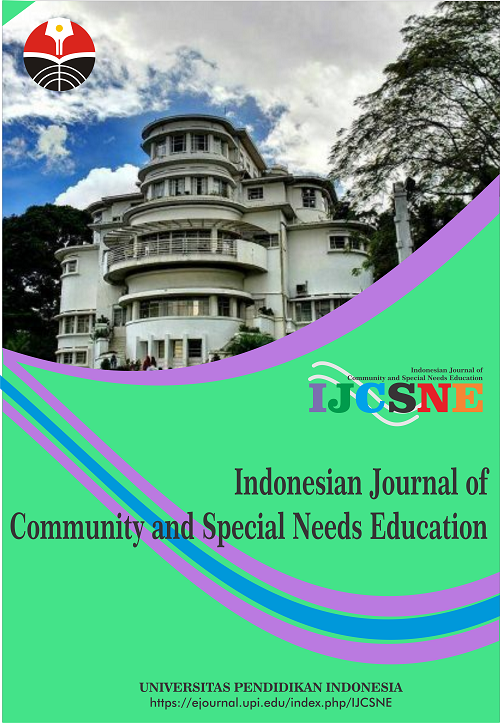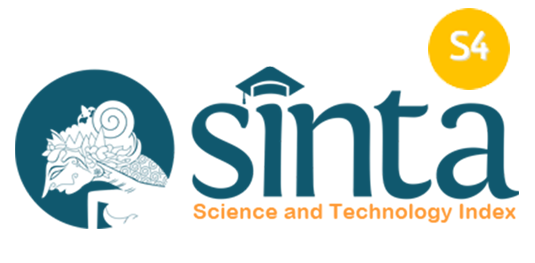Living Gratitude: The Intersection of Emotions, Religiosity, and Prosociality of Growing Up with a Disabled Sibling
Abstract
Keywords
Full Text:
PDFReferences
Beighton, C., and Wills, J. (2019). How parents describe the positive aspects of parenting their child who has intellectual disabilities: A systematic review and narrative synthesis. Journal of Applied Research in Intellectual Disabilities, 32(5), 1255–1279.
Casaleiro, T., Martins, H., and Caldeira, S. (2024, June). Promoting spiritual coping of family caregivers of an adult relative with severe mental illness: Development and test of a nursing intervention. In Healthcare, 12(13), 1247.
Cuskelly, M., and Gunn, P. (2003). Sibling relationships of children with Down syndrome: Perspectives of mothers, fathers, and siblings. American journal on mental retardation, 108(4), 234-244.
Darling, R. B. (2017). Families against the system: Case studies in special education. Journal of Disability Policy Studies, 28(1), 43-50.
Emmons, R. A., and McCullough, M. E. (2003). Counting blessings versus burdens: An experimental investigation of gratitude and subjective well-being in daily life. Journal of Personality and Social Psychology, 84(2), 377-389.
Farrell, A. F., and Krahn, G. L. (2014). Family life goes on: Disability in contemporary families. Family Relations, 63(1), 1-6.
Hastings, R. P., Allen, R., McDermott, K., and Still, D. (2014). Factors related to positive perceptions in family members of children with intellectual disabilities: Longitudinal Data from the UK. Journal of Intellectual and Developmental Disability, 39(2), 89-100.
Lestari, S., Yani, D. I., and Nurhidayah, I. (2018). Kebutuhan orang tua dengan anak disabilitas. Journal of Nursing Care, 1(1), 50-59.
McCullough, M. E., Emmons, R. A., and Tsang, J. A. (2002). The grateful disposition: A conceptual and empirical topography. Journal of Personality and Social Psychology, 82(1), 112-117.
McCullough, M. E., Kimeldorf, M. B., and Cohen, A. D. (2008). An adaptation for altruism: The social causes, social effects, and social evolution of gratitude. Current Directions in Psychological Science, 17(4), 281-285.
Naufal, W. I., and Rahmandani, A. (2020). Pengalaman pengasuhan ibu yang memiliki anak disabilitas fisik berprestasi: sebuah studi fenomenologis deskriptif. Jurnal Empati, 10(2), 122-133.
Nura, A., and Sari, K. (2018). Kebersyukuran pada ibu yang memiliki anak berkebutuhan khusus. Jurnal Ecopsy, 5(2), 73-80.
Penman, J. (2021). Cognitive and behavioral changes arising from spirituality. Journal of Religion and Health, 60(6), 4082-4096.
Rahmawati, D., Utomo, W., and Ariani, M. (2020). Positive caregiving: Exploring the strengths of caregivers for special needs individuals. Indonesian Journal of Disability Studies, 7(2), 55-63
Santoso, A. P., Hartati, E. P., and Kusuma, W. P. (2020). The impact of prosocial behavior on psychological well-being among caregivers of special needs children. Journal of Family and Development, 13(2), 140-152
Saputra, W. D., Prasetya, B. W., and Sari, D. P. (2018). Coping strategies and mental health in caregivers of children with autism spectrum disorder. Journal of Psychological Research, 24(3), 220-230
Sari, I. P., and Mahardika, G. N. (2019). Kasih sayang dan kesejahteraan emosional pada caregiver anak berkebutuhan khusus. Journal of Special Education and Rehabilitation, 15(3), 45-57
Sumarni, R., and Permatasari, A. (2021). Happiness and satisfaction among caregivers of children with special needs: A qualitative study. Journal of Family Studies and Mental Health, 15(2), 101-115
Utami, N. W., Suryani, L. K., and Rahardjo, T. (2019). Psychological resilience in parents of children with special needs. Jurnal Psikologi Pendidikan dan Konseling, 5(1), 75-89.
Wardani, F. A., and Fauziah, I. (2021). Happiness in small achievements: A study on emotional well-being of caregivers of special needs individuals. Journal of Family and Consumer Sciences, 18(1), 92-102.
DOI: https://doi.org/10.17509/ijcsne.v5i1.83186
Refbacks
- There are currently no refbacks.
Copyright (c) 2025 Universitas Pendidikan Indonesia

This work is licensed under a Creative Commons Attribution-ShareAlike 4.0 International License.















